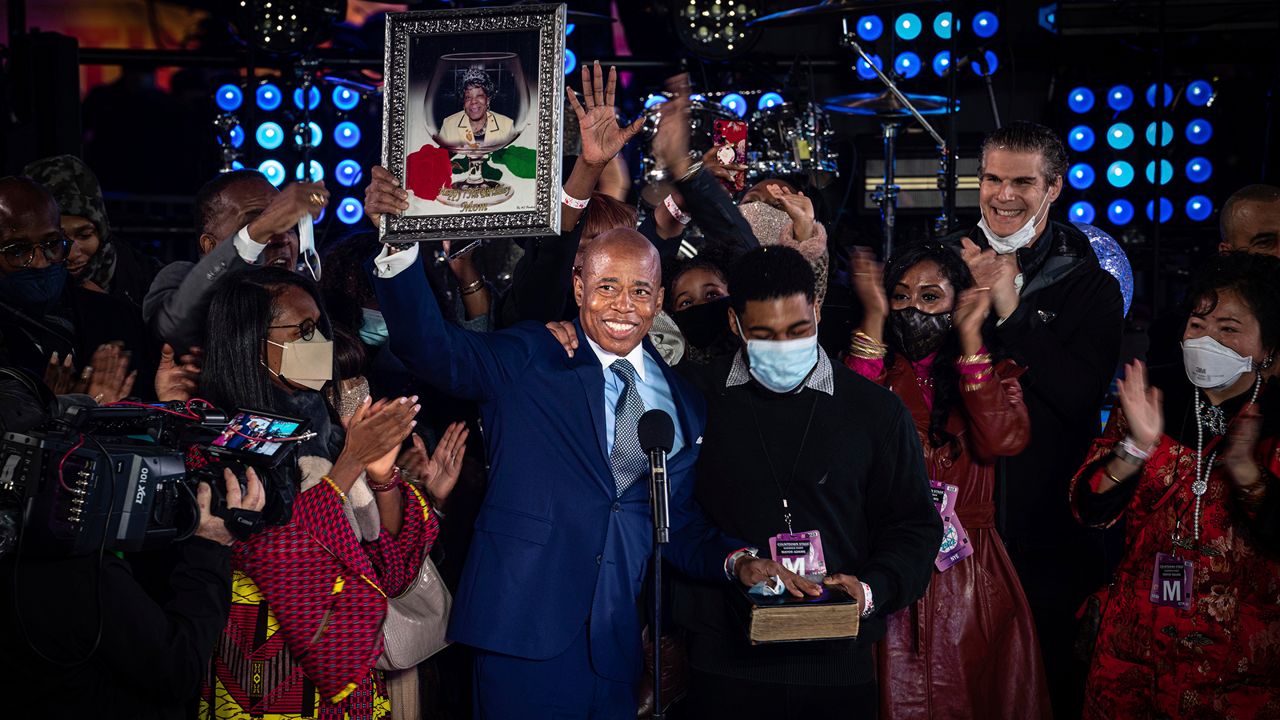With the eyes of the world on Times Square and just seven minutes after the stroke of midnight, Eric Adams placed his right hand on a family Bible and was officially sworn in as New York City's 110th mayor.
"I will faithfully discharge the duties of the office of the mayor of the city of New York, according to the best of my abilities, so help me God,” Adams said to cheers from the crowd.
Adams was joined on stage by his son Jordan Coleman, who held the Bible, and his longtime partner Tracey Collins. Adams took the oath surrounded by family, friends and some of his closest advisors on stage. Adams, whose mother died last year, grew emotional as he recited the oath of office, holding a framed photo of his mother high above his head as he said the words.
Adams, 61, was born in Brownsville and spent his childhood in South Jamaica. He was the fourth of six children to his mother Dorothy, a house cleaner, and his father Leroy. He spent 22 years in the NYPD, retiring as a police captain before entering politics.
During the campaign for mayor, Adams pitched himself as a “blue-collar mayor” who could both relate to the city’s working class and work with the city’s business sector.
Adams begins a new year and kicks off his administration as the city enters its third year of the COVID-19 pandemic, with the omicron variant challenging the city's health care infrastructure. Unemployment remains high, and many in the city’s private sector have yet to return to the office. Event cancellations, and disruptions across businesses and transit, have become common, and infection spikes have led to worker shortages that have forced restaurants and businesses to shut down.
The city continues to battle an uptick in cases as a result of the variant, which has led to the highest number of cases since the start of the pandemic. The average number of cases in New York City reached more than 33,000 on Thursday, a 15 percent increase from just a day prior. Despite hospitals reporting a sharp increase in patients, officials say many of them are far less sick than in previous waves.
The setting of Adams' inauguration, even if downsized, could be seen as a signal that despite the current challenges, Adams is looking to keep the city's recovery moving forward. He has said he is not considering any shutdowns and he has encouraged tourists to travel to the city. A plan to keep schools open is also moving forward.
"Even in the midst of COVID, in the midst of everything that we are going through, this is a country where hope and opportunities is always ever present and we are resilient," Adams said in an interview before he was sworn in.
"We showed the entire globe what we're made of. We're unbelievable. This is an unbelievable city. Trust me, we're ready for a major comeback, because this is New York," he added.
Still, Adams has a set of immediate challenges to deal with as he takes office.
Earlier this week, Adams outlined his plan to combat the pandemic – a set of proposals largely modeled on what his predecessor Bill de Blasio put into place over the past few months. Adams also announced support for a private-sector vaccine mandate in addition to a plan to increase vaccinations and testing, and ensuring New Yorkers are getting their booster shots.
Despite saying that the city is open for business and promising to avoid shutdowns, Adams was forced to rethink his own plans for the inauguration due to the rising number of cases.
Adams had originally planned an indoor ceremony at the Kings Theatre in Brooklyn – a break from traditional ceremonies, which have been held on the steps of City Hall. Adams opted to cancel the Kings Theatre event as cases continued to increase, and officials recommended that New Yorkers avoid large crowds and indoor events.
Although he will not have a traditional inauguration at City Hall, Adams is expected to arrive bright and early for work on Saturday. He is expected to travel to City Hall by subway from his home borough of Brooklyn and will meet with his cabinet and top administration officials, including NYPD Commissioner Keechant Sewell and Schools Chancellor David Banks. Adams is also expected to deliver a noon address to New Yorkers, which will be broadcast from the Blue Room inside City Hall.
In the afternoon, Adams will travel to Queens and visit the 103rd Precinct for officer roll call. It's a stop likely to be steeped in symbolism. The 103rd Precinct is where Adams was beaten by police as a teenager, an experience that would go on to shape his life and ultimately fuel his desire to join the NYPD in an attempt to make reforms from the inside.
Adams made public safety the centerpiece of his campaign. He describes himself as being reform-minded while also being tough on crime, a balance that earned him support among the city's Black voters, the business sector and labor unions at a time of rising crime and frayed relations between communities and police.



